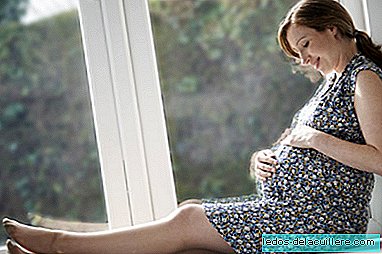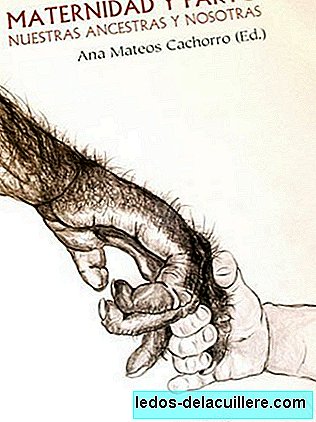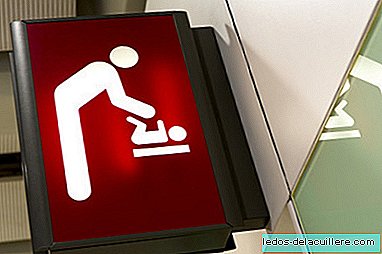
"No, woman, take a drink, nothing happens." "Well, look, occasionally I would have a drink and look at my children, they are great." "The women of now you take everything very tremendous ... you don't have to go to extremes either. If you were to get drunk, okay. But for a little drink you'll tell me what's going to happen to your baby."
These and many others are phrases that are often heard when there is a celebration or celebration, there is alcohol on the table and among the participants at the event there is a pregnant woman. And it is still believed that some alcohol can not affect at all the fetus that is being formed (whose placenta does not filter alcohol), when several investigations say otherwise, and a very recent one even shows that small amounts of alcohol during pregnancy modify the baby's face.
In fetal alcohol syndrome the differences are evident.
It is known that women who drink a lot of alcohol during pregnancy, frequently, have babies who may suffer from the so-called fetal alcohol syndrome, in which there is not only one obvious impairment of the baby's brain development, but it is also accompanied by characteristic facial features: they are children with a flat nose, with rather small eyes, also a small head, with a thin upper lip and without the vertical groove between the nose and lips.
They are children likely to have behavioral and attention disorders, a lower intellectual quotient, and consequently they need therapies from the first moment that can help them develop their full potential, so that they are as autonomous as possible.
Small changes in the face with smaller amounts of alcohol
This is what a recent study says, as we read in NewScientist, by looking at 12-month-old babies and determining how the amount of alcohol consumed by their mothers could have affected the shape of their skulls and faces.
Apparently, they have shown that even when talking about small amounts of alcohol, they can be observed subtle effects on the formation of the baby's face.
To study it, the researchers contacted 1,570 pregnant women who were followed during pregnancy, after birth and until the age of one year of each of their children. Of all of them, 27% explained that they had continued to drink at least some alcohol during pregnancy.

At 12 months after delivery, 415 babies were taken with multiple cameras and from different angles. With these images, 3D images of each of the children were created in which they could analyze up to 70,000 points of the face each. In this way, they could see the subtle differences in the formation of the face of those babies whose mothers had drunk alcohol in comparison to the babies of those who had not consumed it. The most obvious feature, it seems, was that they had a slightly more curved nose, and at the same time a little shorter.
However, in cases where the consumption was lower, these differences were appreciated only by this type of imaging techniques: at first glance it would be very difficult to perceive these changes.
The impact is unknown.
In the children of women who drink a lot of alcohol, the effect on their lives can be clear and evident. However, in cases of low consumption, even when these small changes in the face occur, the actual impact is unknown.
In other words: they don't know if it affects the baby's development in any way, although they do intend to study it. Jane Halliday, research director explains it like this:
We do not know if small changes in the shape of children's faces are connected in any way with differences in their development. We aim to see this as children grow up.
In fact, in less obvious cases, researchers suggest that they don't even have to be durable, since a baby's face changes a lot in the first years of life.
That is why researchers urge mothers who have drunk little during pregnancy not to worry, because for now they have no more data, and because they are aware that many women drink when they still do not know they are pregnant.
Moreover, there are women whose consumption is worrying that they have babies without the aforementioned fetal alcohol syndrome; the problem is that it is not yet known why, and when in doubt the most logical recommendation is that of avoid alcohol as much as possible, basically because a safe minimum dose has not yet been established.
It should be borne in mind that they have only analyzed the subtle modifications of babies' faces, and not other subtleties that could happen in the formation of the organs or even in the formation and brain development. Minimal differences in the nose may not mean anything to a baby, but minimal differences in the liver, heart or brain, to mention some of the most important organs, could mean something more in adulthood.
In any case they are only hypotheses and it is necessary that, as the researchers say, further study on this issue. Meanwhile, what was said: Alcohol is not good for anyone, not for mothers, not for fathers, not for babies. So in general, the less consumed at home, the better. And in case of pregnancy, with more reason.
As I mentioned at the beginning, the placenta does not filter it, so the concentration of alcohol that is obtained in the blood is exactly what the fetus receives. If the mother gets to have "the tip", imagine the fetus, which is much smaller and has its organs still in formation.
Photos | iStock
In Babies and more | The (sad) world map of alcohol during pregnancy, Recommend not to drink alcohol to all women of childbearing age who do not use contraceptives, Yes, it is still necessary to warn that if you are pregnant you should not drink alcohol












